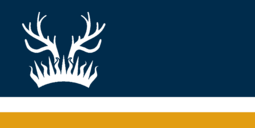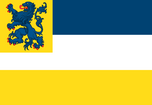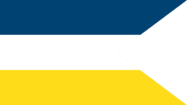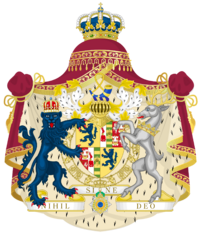Flag of Mascylla: Difference between revisions
No edit summary |
No edit summary |
||
| Line 4: | Line 4: | ||
|Image = MascyllaFlag.png | |Image = MascyllaFlag.png | ||
|Nickname = ''Reichsbanner und Reichshandelsbanner'' | |Nickname = ''Reichsbanner und Reichshandelsbanner'' | ||
|Use = | |Use = {{wp|Civil flag|Civil}} and {{wp|state flag}}, {{wp|civil ensign}} | ||
|Proportion = 1:2 | |Proportion = 1:2 | ||
|Adoption = | |Adoption = 1924 | ||
|Design = | |Design = A horizontal {{wp|tricolour}} of {{wp|blue}}, {{wp|white}}, and {{wp|gold}}, and a depiction of the national crown with the antler of a deer in the {{wp|flag nomenclature|canton}} | ||
|Nickname2= '' | |Nickname2= ''Kriegsbanner'' | ||
|Image2 = | |Image2 = War_flag_Mascylla.png | ||
|Use2 = | |Use2 = {{wp|Ensign}}, {{wp|war flag}} | ||
|Proportion2 = 1:2 | |Proportion2 = 1:2 | ||
|Adoption2 = | |Adoption2 = 1931 | ||
|Design2 = | |Design2 = A horizontal {{wp|tricolour}} of {{wp|blue}}, {{wp|white}}, and {{wp|gold}}, and a depiction of the nation's deer and bear in the {{wp|flag nomenclature|canton}} | ||
|Nickname3= ''Dienstbanner der See- und Luftstreitkräfte der Reichswehr'' | |||
|Image3 = Ensign_Mascylla.png | |||
|Use3 = {{wp|Naval ensign}}, {{wp|naval jack}}, {{wp|fin flash}} | |||
|Proportion3 = 1:2 | |||
|Adoption3 = 1924 | |||
|Design3 = A swallowtail of the ensign without the deer and bear in the {{wp|flag nomenclature|canton}} | |||
}} | }} | ||
The '''flag of [[Mascylla]]''' or '''Mascyllary flag''' ( | The '''flag of [[Mascylla]]''' or '''Mascyllary flag''' ({{wp|German language|Hesurian}}: ''Maskillische Flagge'') is a {{wp|tricolour}} flag consisting of three unequally large horizontal bands displaying the national colours of Mascylla: blue, white, and gold (Hesurian: ''Blau-Weiß-Gold''). The flag was first adopted as the national flag of modern Mascylla after the [[Mascyllary Revolution]], though its main design has been largely attributed to the nation's earlier flag of the [[Mascyllary Kingdom]], for a [[Mascyllary Revolution|brief interruption in 1923]]. | ||
While the meaning of the main colours of the flag are not exclusively explained in the | While the meaning of the main colours of the flag are not exclusively explained in the any government document, a symbolism was slowly attributed to them. {{wp|Blue}} stands for the long {{wp|polar night|polar nights}}, which occasionally occur at areas that northernly, while they also depict the oceans and rivers. {{wp|White}} stands for the purity of the monarchy, the people, and the state, while also symbolizing the snow of winter. And finally {{wp|gold}}, which depict the colour of the crown and the main colour of the [[House of Ahnern]], which currently rules Mascylla through its {{wp|sovereign}} [[Dorothea I of Mascylla|Dorothea I]]. Another version, which has been widely accepted, is that the blue stands for the [[Elbgau Confederation]], which victoriously fought of Adwhin in the [[War of the Five Kings]] to unite Mascylla, hence the smaller and lower stripes of gold and white. However, historians agree upon that King Lukas I personally drafted the earliest version of the flag in the final peace negotiations in Langquaid in 1793. It has since been used as the Mascyllary flag, with a brief interruption of a horizontal tricolour of the same colours for the provisional [[Mascyllary Revolution|May Republic]]. | ||
==Design== | |||
At the time of the adoption of the flag there were no exact colour specifications other than "the colours of blue, white, and gold". However on 11 May 1973, the High Cout of the Realm introduced a corporate design for the [[Government of Mascylla|government of Mascylla]] which defined the specifications of the official colors as: | |||
{| border="1" cellpadding="2" cellspacing="0" style="width:60%; background:#f9f9f9; border:1px solid #aaa; border-collapse:collapse; white-space:nowrap; text-align:left;" | |||
|- | |||
! width=100|Colour scheme | |||
! colspan="2" style="width:100px;"|Blue | |||
! colspan="2" style="width:100px;"|White | |||
! colspan="2" style="width:100px;"|Gold | |||
|- align=center | |||
| {{wp|RAL (color space system)|RAL}} | |||
| rowspan="6" style="background:#000; width:20px;"| | |||
| 5026<br />''Denim blue'' | |||
| rowspan="6" style="background:#f00; width:20px;"| | |||
| 9010<br />''White'' | |||
| rowspan="6" style="background:#fc0; width:20px;"| | |||
| 1004<br />''Golden yellow'' | |||
|- align=center | |||
| {{wp|HKS color system|HKS}} | |||
| 2.3G 2.9/1.8 | |||
| 1, 1, 1 | |||
| 1.5Y 2.9/1.1 | |||
|- align=center | |||
| {{wp|CMYK color model|CMYK}} | |||
| 50.0.2.73 | |||
| 0.0.0.0 | |||
| 0.0.90.14 | |||
|- align=center | |||
| {{wp|Pantone}} | |||
| 1432 | |||
| White | |||
| 5442* | |||
|- align=center | |||
| {{wp|Web color}} | |||
| #131E3A | |||
| #FFFFFF | |||
| #E29D12 | |||
|- align=center | |||
| Decimal {{wp|RGB}} | |||
| 16,21,298 | |||
| 0,0,0 | |||
| 11,182,63 | |||
|} | |||
==National flags== | ==National flags== | ||
Revision as of 18:57, 24 February 2020
 | |
| Name | Reichsbanner und Reichshandelsbanner |
|---|---|
| Use | Civil and state flag, civil ensign |
| Proportion | 1:2 |
| Adopted | 1924 |
| Design | A horizontal tricolour of blue, white, and gold, and a depiction of the national crown with the antler of a deer in the canton |
 Variant flag of Mascylla | |
| Name | Kriegsbanner |
| Use | Ensign, war flag |
| Proportion | 1:2 |
| Adopted | 1931 |
| Design | A horizontal tricolour of blue, white, and gold, and a depiction of the nation's deer and bear in the canton |
 Variant flag of Mascylla | |
| Name | Dienstbanner der See- und Luftstreitkräfte der Reichswehr |
| Use | Naval ensign, naval jack, fin flash |
| Proportion | 1:2 |
| Adopted | 1924 |
| Design | A swallowtail of the ensign without the deer and bear in the canton |
The flag of Mascylla or Mascyllary flag (Hesurian: Maskillische Flagge) is a tricolour flag consisting of three unequally large horizontal bands displaying the national colours of Mascylla: blue, white, and gold (Hesurian: Blau-Weiß-Gold). The flag was first adopted as the national flag of modern Mascylla after the Mascyllary Revolution, though its main design has been largely attributed to the nation's earlier flag of the Mascyllary Kingdom, for a brief interruption in 1923.
While the meaning of the main colours of the flag are not exclusively explained in the any government document, a symbolism was slowly attributed to them. Blue stands for the long polar nights, which occasionally occur at areas that northernly, while they also depict the oceans and rivers. White stands for the purity of the monarchy, the people, and the state, while also symbolizing the snow of winter. And finally gold, which depict the colour of the crown and the main colour of the House of Ahnern, which currently rules Mascylla through its sovereign Dorothea I. Another version, which has been widely accepted, is that the blue stands for the Elbgau Confederation, which victoriously fought of Adwhin in the War of the Five Kings to unite Mascylla, hence the smaller and lower stripes of gold and white. However, historians agree upon that King Lukas I personally drafted the earliest version of the flag in the final peace negotiations in Langquaid in 1793. It has since been used as the Mascyllary flag, with a brief interruption of a horizontal tricolour of the same colours for the provisional May Republic.
Design
At the time of the adoption of the flag there were no exact colour specifications other than "the colours of blue, white, and gold". However on 11 May 1973, the High Cout of the Realm introduced a corporate design for the government of Mascylla which defined the specifications of the official colors as:
| Colour scheme | Blue | White | Gold | |||
|---|---|---|---|---|---|---|
| RAL | 5026 Denim blue |
9010 White |
1004 Golden yellow | |||
| HKS | 2.3G 2.9/1.8 | 1, 1, 1 | 1.5Y 2.9/1.1 | |||
| CMYK | 50.0.2.73 | 0.0.0.0 | 0.0.90.14 | |||
| Pantone | 1432 | White | 5442* | |||
| Web color | #131E3A | #FFFFFF | #E29D12 | |||
| Decimal RGB | 16,21,298 | 0,0,0 | 11,182,63 | |||
National flags
| Flag | Date | Use |
|---|---|---|
 |
1951-present | Civil flag and ensign |
| File:Massk.png | 1950-present | State flag and ensign |
Ensigns
| Flag | Date | Use |
|---|---|---|
| File:MascyllaArmy.png | 1915-present | Flag of the Armed Forces (Reichswehr) |
| File:MascyllaNavy.png | 1952-present | Flag of the Navy (Marine) |
| File:NAVYA.png | 1879-present | Naval Jack, flown in international and or foreign territorial waters (Signalmarinenfahne) |
Historical flags
Alliances and pacts prior to Mascyllary unification
| Flag | Date | Use |
|---|---|---|
| File:CreA.png | 1698-1793 | Flag of the Crowned Alliance between Adwhin and Hohnern |
| File:Bounde.png | 1760-1792 | Flag of the Bound |
| File:Freed.png | 1792-1793 | Flag of the Nationalist movement supporting Mascyllary unification |
United Mascylla
| Flag | Date | Use |
|---|---|---|
| File:Freed.png | 1793-1793 | Flag of the Kingdom of Mascylla |
 |
1793-1950 | Flag of the Kingdom of Mascylla following the Vyno-Mascyllary War in 1800 |
| File:Massk.png | 1950-1951 | Flag of the Mascyllary Republic |
 |
1951-present | Flag of the Crowned Republic of Mascylla |
Subnational flags
| Flag | Date | Use |
|---|---|---|
 |
1839-present | Flag of the islands of Theresa and Phemlia |
| File:Panjib.png | 1819-present | Flag of the island of Panjib |
| File:Moku'ainaFlag.png | 1834-present | Flag of the islands of Tainoa |
